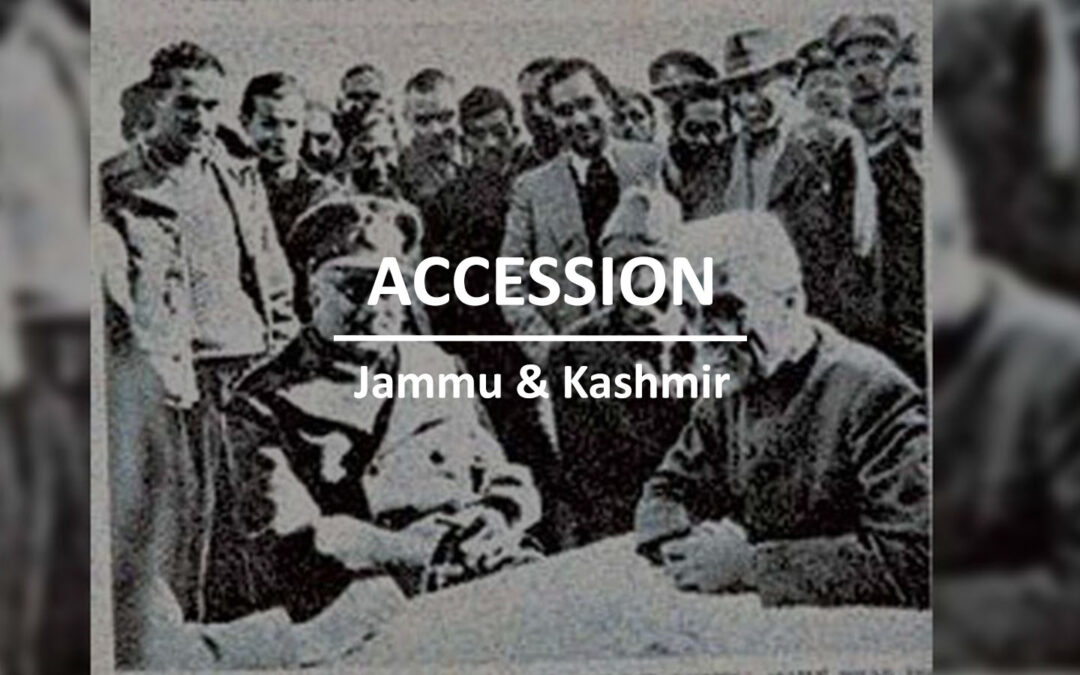Justice Mehr Chand Mahajan, the Maharaja’s nominee for his next prime minister, visited Nehru and Patel in Delhi on 19 September 1947, requesting essential supplies which had been blockaded by Pakistan since the beginning of September. He communicated the Maharaja’s willingness to accede to India. Nehru, however, demanded that the jailed political leader, Sheikh Abdullah, be released from prison and involved in the state government. Only then would he allow the state to accede. The Maharaja released Sheikh Abdullah on 29 September.
The Maharaja’s troops could not withstand the tribal militia attack in September and October 1947; they were heavily outnumbered and outgunned by the tribal militias, and were also facing internal rebellions from Muslim troops. The Maharaja made an urgent plea to Delhi for military assistance. Upon the Governor General Lord Mountbatten’s insistence, India required the Maharaja to accede before it could send troops. Accordingly, the Maharaja signed an instrument of accession on 26 October 1947, which was accepted by the Governor General the next day. While the Government of India accepted the accession, it added the proviso that it would be submitted to a “reference to the people” after the state is cleared of the invaders, since “only the people, not the Maharaja, could decide where Kashmiris wanted to live.”; it was a provisional accession. The largest political party, National Conference, headed by Sheikh Abdullah, endorsed the accession. In the words of the National Conference leader Syed Mir Qasim, India had the “legal” as well as “moral” justification to send in the army through the Maharaja’s accession and the people’s support of it.
The Indian troops, which were airlifted in the early hours of 27 October, secured the Srinagar airport. The city of Srinagar was being patrolled by the National Conference volunteers with Hindus and Sikhs moving about freely among Muslims, an “incredible sight” to visiting journalists. The National Conference also worked with the Indian Army to secure the city.
In the north of the state lay the Gilgit Agency, which had been leased by British India but returned to the Maharaja shortly before Independence. Gilgit’s population did not favour the State’s accession to India. Sensing their discontent, Major William Brown, the Maharaja’s commander of the Gilgit Scouts, mutinied on 1 November 1947, overthrowing the Governor Ghansara Singh. The bloodless coup d’etat was planned by Brown to the last detail under the code name “Datta Khel”. Local leaders in Gilgit formed a provisional government (Aburi Hakoomat), naming Raja Shah Rais Khan as the president and Mirza Hassan Khan as the commander-in-chief. But, Major Brown had already telegraphed Khan Abdul Qayyum Khan asking Pakistan to take over. According to historian Yaqoob Khan Bangash, the provisional government lacked sway over the population which had intense pro-Pakistan sentiments. Pakistan’s Political Agent, Khan Mohammad Alam Khan, arrived on 16 November and took over the administration of Gilgit. According to various scholars, the people of Gilgit as well as those of Chilas, Koh Ghizr, Ishkoman, Yasin, Punial, Hunza and Nagar joined Pakistan by choice.
Read more on Indo-Pakistani War of 1947
*The content above has been entirely copied from Wikipedia, a globally recognized free online encyclopedia, for the sheer purpose of sharing knowledge. Phuro Innovations (OPC) Private Limited is not responsible in any ways for the mentioned facts and figures.


Recent Comments